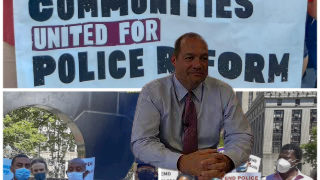
YONKERS: With a thousand protesters in the streets; Yonkers PBA President Keith Olson took a knee with protesters and promised to support police reforms, as Yonkers Police Commissioner John Mueller stopped and shook hands with Hector Santiago.
But later when the Yonkers PD Police received an open-records request from the media seeking documents detailing any allegations of misconduct against current or former officers and any discipline the department imposed the YPD requested requested thousands of dollars for the public records paid for by taxpayers.
Six months ago, New York lawmakers and Gov. Andrew Cuomo repealed Section 50-a of the state Civil Rights Law, a once-obscure provision that the Yonkers Police had used to shield police disciplinary records from public view for decades.
The Governor’s repeal came amid protests in Yonkers and across the state following the death of George Floyd, who died in police custody after an officer pressed a knee into his neck for nearly nine minutes.
But the Yonkers Police Department is refusing to release the documents on bad YPD officers and is seeking to illegally obstruct the state’s Freedom of Information Law (FOIL).
Some online comments on Yonkers forums have suggested that the YPD disciplinary records have been mishandled and possibly illegally destroyed.
Even though Section 50-a has been repealed by Gov. Andrew Cuomo, the battle for disciplinary records wages on in the city of hills.
In an executive order issued the same day he signed the Section 50-A repeal, Governor Andrew Cuomo had required local governments to submit plans for reform in their police departments in order to qualify for state aid.
And Yonkers Police Commissioner John Mueller could cost the homeowners of Yonkers multi-millions, by jeopardize the state aid by illegally obstructing the release of public records in an effort to protect bad cops in the city of hills.
Police Commissioner John Mueller has admitted that there were at least 40 complaints against officers and they were primarily from communities of color in Southwest Yonkers.
Community activists say there are many more complaints, because residents of color are often threatened with arrest, when they go to their local police precinct to complain.
Under FOIL, state and local agencies have five business days to acknowledge requests for documents.
Just three weeks after the repeal, the New York State department committee on open government the law would apply to “all law enforcement disciplinary records maintained by a law enforcement agency regardless of the current employment status of the subject individual.”
But police sources say there have been some that have tried to claim that the law doesn’t apply to existing records, only those created after the 50-a repeal.
They claim releasing unfounded complaints would be an unwarranted invasion of privacy and should be kept from the public eye.
So far state and federal courts have ruled on the side of transparency, ruling against unions in Buffalo and New York City and New York’s fourth largest city may find that it is once again making national headlines
In July and August, ProPublica and the New York Civil Liberties Union released New York Police Department misconduct information they had received following a FOIL request to the New York City Civilian Complaint Review Board, an independent agency tasked with investigating reports of civilian abuse by police.
The unions had tried to block the public release of the more-than-300,000 documents, but a federal district judge allowed them to be posted.
The New York Civil Liberties Union filed a lawsuit against the Rochester Police Department, which had not responded to a request for disciplinary records.
Police police-reform groups say the difficulty with police transparency in Yonkers and Rochester could cause a renewed look in Albany, that will greatly strengthen the public right to law enforcement documents.
In a letter to the Committee on Open Government last month, nine government watchdog organizations called on the committee to step in prevent police departments, like Yonkers from obstructing the public’s right to access police disciplinary records.
Currently New York State media outlets, not for profits and universities are filing records requests with police agencies in order to create a searchable, first-of-its-kind database with disciplinary records from across the state, but Yonkers Police Commissioner John Mueller is refusing to cooperate with the good government initiative.
The bottom line is that Yonkers Police Commissioner John Mueller needs to put in place plans to allow residents of color, and all others, to easily see YPD disciplinary records – and he is required to this with community input and be completed by April 1, 2021.
The state Legislature, approved the repeal in June and Yonkers’ Majority Leader Andrea Stewart Cousins needs to stand up for those she represents in the city of hills and legislatively make sure that Yonkers Police Commissioner John Mueller Follows the spirit of the law that lets residents see the public disciplinary records of YPD officers.
The record clearly shows that when the time came to stand up for good government and modern police practices, Yonkers Police Commissioner John Mueller hid in his office and refused to participate and protect the good people in the city of hills.